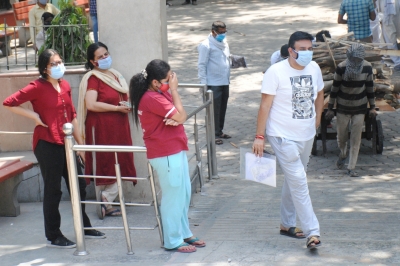BBC tops chart of global panic superspreaders amid India's Covid waves
By IANS | Updated: June 2, 2021 16:07 IST2021-06-02T13:15:02+5:302021-06-02T16:07:37+5:30
New Delhi, June 2 The BBC, Washington Post and New York Times repeatedly used absolute numbers of Covid ...

BBC tops chart of global panic superspreaders amid India's Covid waves
New Delhi, June 2 The BBC, Washington Post and New York Times repeatedly used absolute numbers of Covid positive cases in India or in some Indian city, to declare it the worst hit by the pandemic, says Shantanu Gupta, author and policy commentator.
They have conveniently missed taking the reference of cases per million of population. Because if one takes cases per million or casualties per million, India is one of the far better performing country on the global map, Gupta said.
With 176 "Fear Inducing, Hyperbolic, Critical or Doubting" headlines, BBC tops the charts of panic superspreaders among those in terms of volumes of biased headlines.
With 96 per cent of its headlines published in 14 months under "Panic Spreading or Mis-leading" category, The Guardian tops the chart in the total share of biased headlines.
For WashPost and NYT, 88 per cent of their headlines are Panic Spreading or Mis-leading. These publications are hardly interested in factual reporting and seems to be very keen on narrative building. That's why just 22 per cent of the headlines convey neutral reporting.
In an analysis on tracing global panic super-spreaders in India during Covid waves Gupta said BBC tops the chart.
"Specially the media houses from the west tried extra hard, in these tough times, to support their long-term cause of bashing India. Our detailed research on the headlines of 550+ articles published on the Covid vis-à-vis India in the last 14 months in the top USA and UK based publications, gives us shocking results. A large majority of these headlines are just fear-inducing and misleading," Gupta said.
Gupta tracked the coverage of 6 global publications - BBC, The Economist, The Guardian, Washington Post, New York Times & CNN via web search results, of their Covid pandemic reportage in India over a 14 months period.
This period is easily carved up in 2 pieces – Before the second surge i.e. Mar'20-Mar'21 and after the second surge i.e. from Apr'21.
These 6 global media houses BBC, The Economist, The Guardian, Washington Post, New York Times, CNN did a whopping 552 articles on Covid stories just related to India from March 1, 2020 to April 30, 2021. BBC, the state-owned news broadcaster of UK, led the pack with 274 stories, followed by New York times with 91 stories and Washington post with 69 stories. BBC with almost 50 per cent share in the published articles on India confirms the colonial hangover with which it continues to comment on India, Gupta said.
Only an abysmal 2 per cent of these global headlines were praising India's Covid effort and a whopping 76 per cent headlines were Fear Inducing, Hyperbolic, Critical, Doubting.
Around 60 per cent of the BBC headlines before April 2021 were Panic Spreaders or mis-leading but in April'21 BBC framed 82 per cent Panic Spreader and mis-leading headlines. The other 5 media house learnt from BBC to published almost same, or in some cases exceed, article volume in 1 month (Apr'21) compared to the 13-month period of March '20-March '21. WashPost and CNN did more than 50 per cent of their stories on India just in the month of April '21 in last 14 month.
Gupta said it's time for the Indian state and for Ind to investigate, decide & act on the true role of international media houses with their hidden & direct agendas.
Disclaimer: This post has been auto-published from an agency feed without any modifications to the text and has not been reviewed by an editor
Open in app